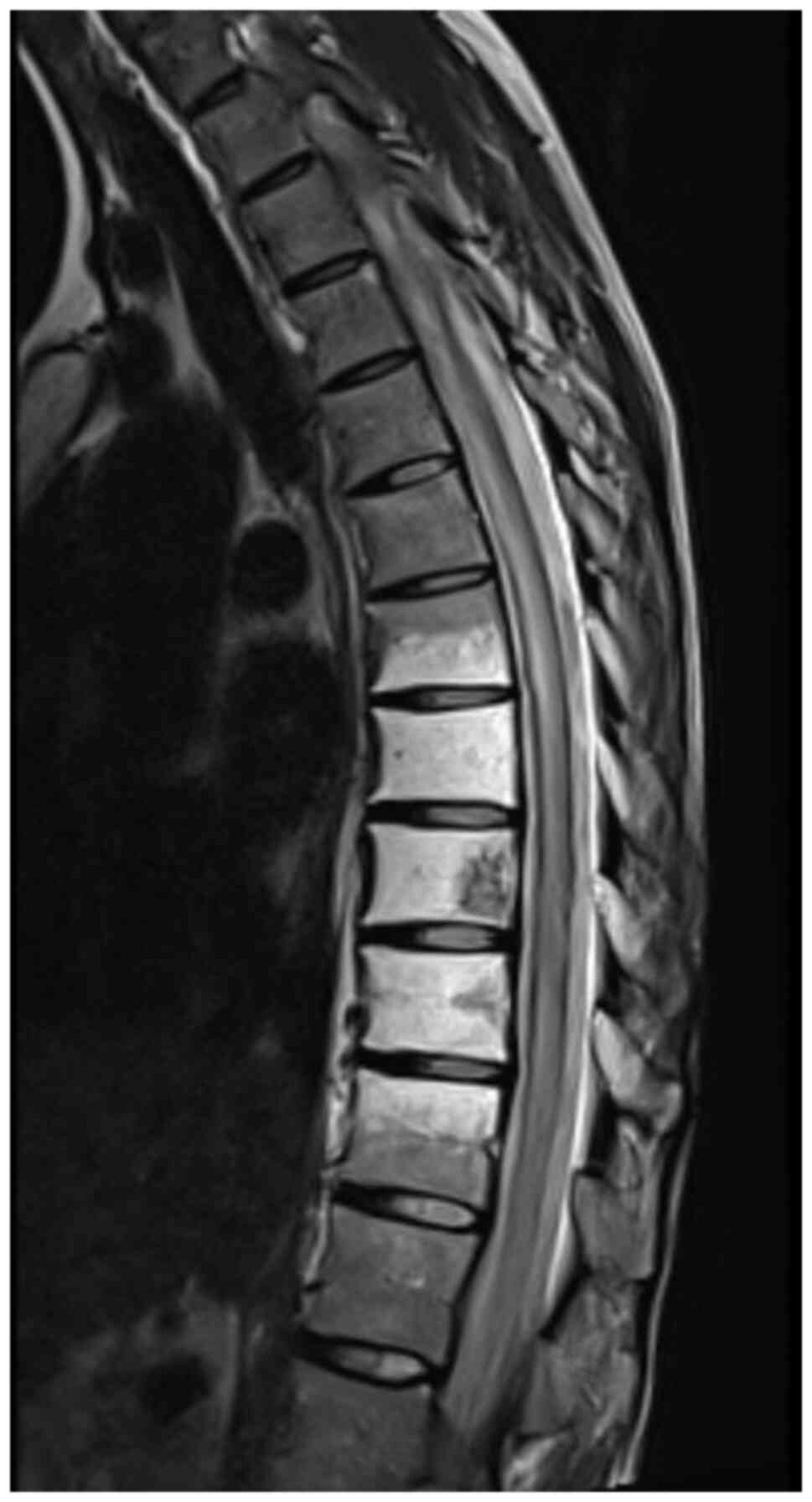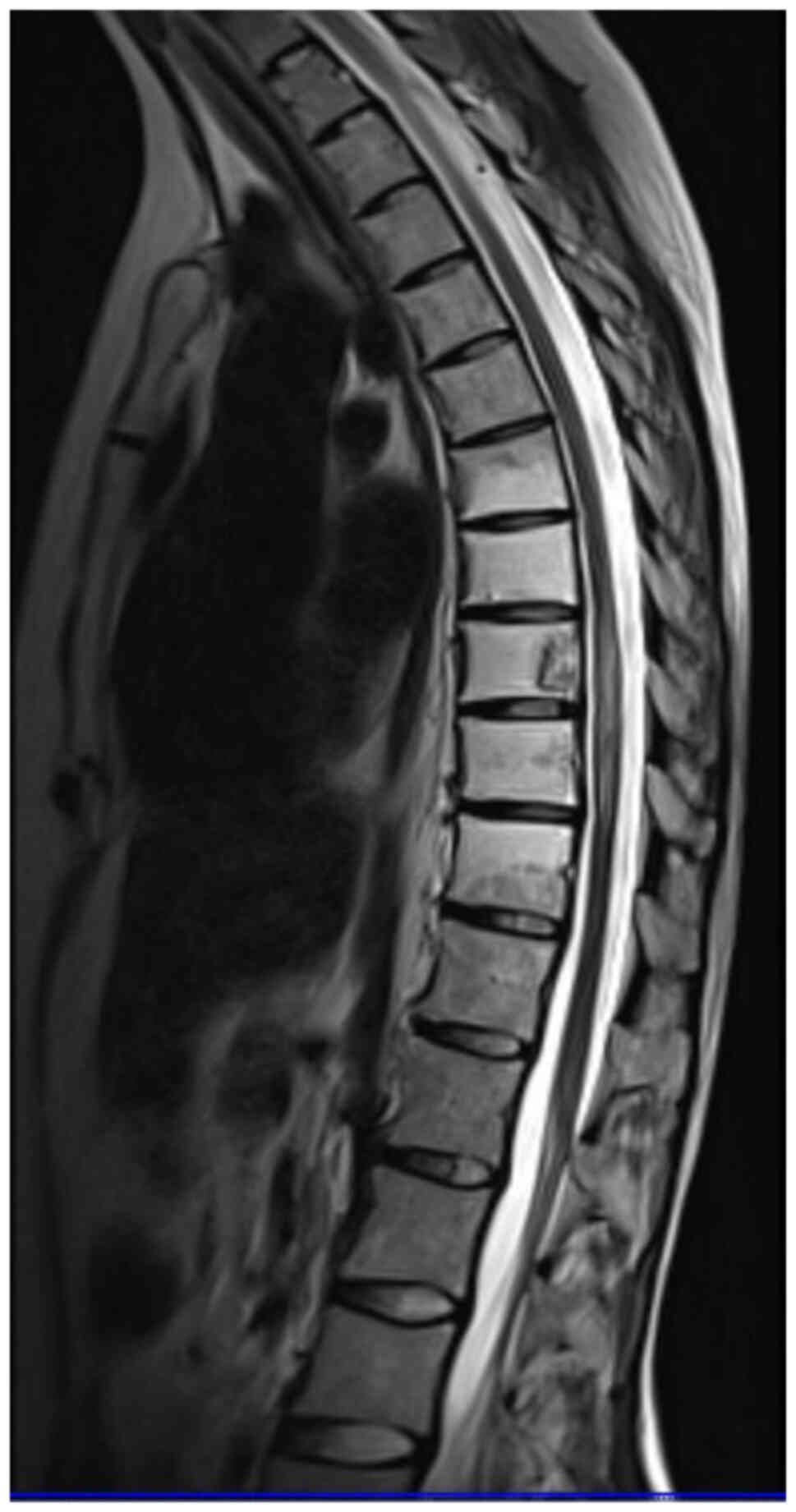|
1
|
Franzin R, Netti GS, Spadaccino F, Porta
C, Gesualdo L, Stallone G, Castellano G and Ranieri E: The use of
immune checkpoint inhibitors in oncology and the occurrence of AKI:
Where do we stand? Front Immunol. 11:5742712020. View Article : Google Scholar : PubMed/NCBI
|
|
2
|
Postow MA, Sidlow R and Hellmann MD:
Immune-related adverse events associated with immune checkpoint
blockade. N Engl J Med. 378:158–168. 2018. View Article : Google Scholar : PubMed/NCBI
|
|
3
|
Cuzzubbo S, Javeri F, Tissier M, Roumi A,
Barlog C, Doridam J, Lebbe C, Belin C, Ursu R and Carpentier AF:
Neurological adverse events associated with immune checkpoint
inhibitors: Review of the literature. Eur J Cancer. 73:1–8. 2017.
View Article : Google Scholar : PubMed/NCBI
|
|
4
|
Tobin WO, Weinshenker BG and Lucchinetti
CF: Longitudinally extensive transverse myelitis. Curr Opin Neurol.
27:279–289. 2014. View Article : Google Scholar : PubMed/NCBI
|
|
5
|
Kitley J, Leite M, George J and Palace J:
The differential diagnosis of longitudinally extensive transverse
myelitis. Mult Scler. 18:271–285. 2012. View Article : Google Scholar : PubMed/NCBI
|
|
6
|
Lee CR, Suh J, Jang D, Jin BY, Cho J, Lee
M, Sim H, Kang M, Lee J, Park JH, et al: Comprehensive molecular
characterization of TFE3-rearranged renal cell carcinoma. Exp Mol
Med. 56:1807–1815. 2024. View Article : Google Scholar : PubMed/NCBI
|
|
7
|
Oken MM, Creech RH, Tormey DC, Horton J,
Davis TE, McFadden ET and Carbone PP: Toxicity and response
criteria of the eastern cooperative oncology group. Am J Clin
Oncol. 5:649–656. 1982. View Article : Google Scholar : PubMed/NCBI
|
|
8
|
Gritsch D and Valencia-Sanchez C:
Drug-related immune-mediated myelopathies. Front Neurol.
13:10032702022. View Article : Google Scholar : PubMed/NCBI
|
|
9
|
McLean BN, Luxton RW and Thompson EJ: A
study of immunoglobulin G in the cerebrospinal fluid of 1007
patients with suspected neurological disease using isoelectric
focusing and the Log IgG-Index. A comparison and diagnostic
applications. Brain. 113:1269–1289. 1990. View Article : Google Scholar : PubMed/NCBI
|
|
10
|
Tumani H, Petereit HF, Gerritzen A, Gross
CC, Huss A, Isenmann S, Jesse S, Khalil M, Lewczuk P, Lewerenz J,
et al: S1 guidelines ‘lumbar puncture and cerebrospinal fluid
analysis’ (abridged and translated version). Neurol Res Pract.
2:82020. View Article : Google Scholar : PubMed/NCBI
|
|
11
|
Simonaggio A, Ambrosetti D, Verkarre V,
Auvray M, Oudard S and Vano YA: MiTF/TFE translocation renal cell
carcinomas: From clinical entities to molecular insights. Int J Mol
Sci. 23:76492022. View Article : Google Scholar : PubMed/NCBI
|
|
12
|
Ross H and Argani P: Xp11 translocation
renal cell carcinoma. Pathology. 42:369–373. 2010. View Article : Google Scholar : PubMed/NCBI
|
|
13
|
Magers MJ, Udager AM and Mehra R: MiT
family translocation-associated renal cell carcinoma: A
contemporary update with emphasis on morphologic, immunophenotypic,
and molecular mimics. Arch Pathol Lab Med. 139:1224–1233. 2015.
View Article : Google Scholar : PubMed/NCBI
|
|
14
|
Manucha V, Sessums MT, Lewin J and Akhtar
I: Cyto-histological correlation of Xp11.2 translocation/TFE3 gene
fusion associated renal cell carcinoma: Report of a case with
review of literature. Diagn Cytopathol. 46:267–270. 2018.
View Article : Google Scholar : PubMed/NCBI
|
|
15
|
Argani P, Laé M, Ballard ET, Amin M,
Manivel C, Hutchinson B, Reuter VE and Ladanyi M: Translocation
carcinomas of the kidney after chemotherapy in childhood. J Clin
Oncol. 24:1529–1534. 2006. View Article : Google Scholar : PubMed/NCBI
|
|
16
|
Antonia S, Goldberg SB, Balmanoukian A,
Chaft JE, Sanborn RE, Gupta A, Narwal R, Steele K, Gu Y, Karakunnel
JJ and Rizvi NA: Safety and antitumour activity of durvalumab plus
tremelimumab in non-small cell lung cancer: A multicentre, phase 1b
study. Lancet Oncol. 17:299–308. 2016. View Article : Google Scholar : PubMed/NCBI
|
|
17
|
Moodie T, Alshaqi O and Alchaki A:
Longitudinal extensive transverse myelitis after chemoradiation
therapy with durvalumab, a rare complication: Case report. BMC
Neurol. 22:1072022. View Article : Google Scholar : PubMed/NCBI
|
|
18
|
Carnero Contentti E and Correale J:
Neuromyelitis optica spectrum disorders: From pathophysiology to
therapeutic strategies. J Neuroinflammation. 18:2082021. View Article : Google Scholar : PubMed/NCBI
|
|
19
|
Chatterton S, Xi S, Jia JX, Krause M, Long
GV, Atkinson V, Menzies AM, Fernando SL, Boyle T, Kwok S, et al:
Case series: Immune checkpoint inhibitor-induced transverse
myelitis. Front Neurol. 14:11303132023. View Article : Google Scholar : PubMed/NCBI
|
|
20
|
Picca A, Berzero G, Bihan K, Jachiet V,
Januel E, Coustans M, Cauquil C, Perrin J, Berlanga P, Kramkimel N,
et al: Longitudinally extensive myelitis associated with immune
checkpoint inhibitors. Neurol Neuroimmunol Neuroinflamm.
8:e9672021. View Article : Google Scholar : PubMed/NCBI
|
|
21
|
Yoest JM: Clinical features, predictive
correlates, and pathophysiology of immune-related adverse events in
immune checkpoint inhibitor treatments in cancer: A short review.
Immunotargets Ther. 6:73–82. 2017. View Article : Google Scholar : PubMed/NCBI
|
|
22
|
Thompson JA, Schneider BJ, Brahmer J,
Achufusi A, Armand P, Berkenstock MK, Bhatia S, Budde LE, Chokshi
S, Davies M, et al: Management of immunotherapy-related toxicities,
version 1.2022, NCCN clinical practice guidelines in oncology. J
Natl Compr Canc Netw. 20:387–405. 2022. View Article : Google Scholar : PubMed/NCBI
|
|
23
|
Chang VA, Simpson DR, Daniels GA and
Piccioni DE: Infliximab for treatment-refractory transverse
myelitis following immune therapy and radiation. J Immunother
Cancer. 6:1532018. View Article : Google Scholar : PubMed/NCBI
|
|
24
|
Garcia CA, El-Ali A, Rath TJ, Contis LC,
Gorantla V, Drappatz J and Davar D: Neurologic immune-related
adverse events associated with adjuvant ipilimumab: Report of two
cases. J Immunother Cancer. 6:832018. View Article : Google Scholar : PubMed/NCBI
|
|
25
|
Halperin EC, Brady LW, Perez CA and Wazer
DE: Perez & Brady's principles and practice of radiation
oncology. 6th. Lippincott Williams & Wilkins; Philadephia:
2013
|
|
26
|
Schultheiss TE: The radiation
dose-response of the human spinal cord. Int J Radiat Oncol Biol
Phys. 71:1455–1459. 2008. View Article : Google Scholar : PubMed/NCBI
|
|
27
|
Okada S and Okeda R: Pathology of
radiation myelopathy. Neuropathology. 21:247–265. 2001. View Article : Google Scholar : PubMed/NCBI
|
|
28
|
Khan M, Ambady P, Kimbrough D, Shoemaker
T, Terezakis S, Blakeley J, Newsome SD and Izbudak I:
Radiation-induced myelitis: Initial and follow-up MRI and clinical
features in patients at a single tertiary care institution during
20 years. AJNR Am J Neuroradiol. 39:1576–1581. 2018.PubMed/NCBI
|
|
29
|
Seddon B, Cassoni A, Galloway M, Rees J
and Whelan J: Fatal radiation myelopathy after high-dose busulfan
and melphalan chemotherapy and radiotherapy for Ewing's sarcoma: A
review of the literature and implications for practice. Clin Oncol
(R Coll Radiol). 17:385–390. 2005. View Article : Google Scholar : PubMed/NCBI
|
|
30
|
Rubin P: The Franz Buschke lecture: Late
effects of chemotherapy and radiation therapy: A new hypothesis.
Int J Radiat Oncol Biol Phys. 10:5–34. 1984. View Article : Google Scholar : PubMed/NCBI
|
|
31
|
Chao MW, Wirth A, Ryan G, MacManus M and
Liew K: Radiation myelopathy following transplantation and
radiotherapy for non-Hodgkin's lymphoma. Int J Radiat Oncol Biol
Phys. 41:1057–1061. 1998. View Article : Google Scholar : PubMed/NCBI
|
|
32
|
Sridharan V, Margalit DN, Lynch SA,
Severgnini M, Hodi FS, Haddad RI, Tishler RB and Schoenfeld JD:
Effects of definitive chemoradiation on circulating immunologic
angiogenic cytokines in head and neck cancer patients. J Immunother
Cancer. 4:322016. View Article : Google Scholar : PubMed/NCBI
|
|
33
|
Ludgate CM: Optimizing cancer treatments
to induce an acute immune response: Radiation Abscopal effects,
PAMPs, and DAMPs. Clin Cancer Res. 18:4522–4525. 2012. View Article : Google Scholar : PubMed/NCBI
|
|
34
|
Hwang WL, Pike LR, Royce TJ, Mahal BA and
Loeffler JS: Safety of combining radiotherapy with
immune-checkpoint inhibition. Nat Rev Clin Oncol. 15:477–494. 2018.
View Article : Google Scholar : PubMed/NCBI
|
|
35
|
Nightingale H, Witherick J and Wilkins A:
Diagnosis of longitudinally extensive transverse myelitis. BMJ Case
Rep. 2011:bcr10201034442011. View Article : Google Scholar : PubMed/NCBI
|
















